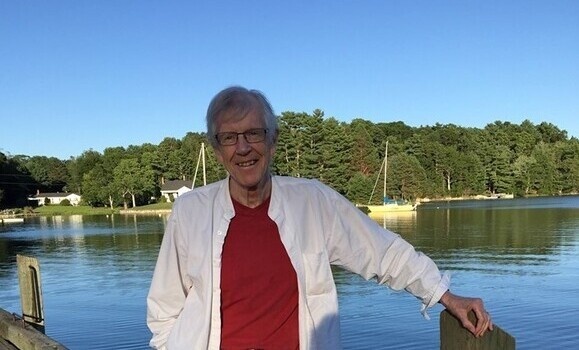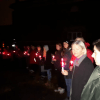
Michael Cross, former Professor of History at Dalhousie University, passed on September 18, 2019. On December 6th, a large number of colleagues and students gathered with family and friends in memorial. What follows is written by historian Todd McCallum.
Arriving in Nova Scotia in late August 2001, I only met Michael after 911. This was also the year the History Department relocated from three Seymour Street houses to the Marion McCain building.
As an Upper Canadian who wrote about British Columbia, my knowledge of Nova Scotian history was scant compared to what I knew about other regions. Coming from Queen’s, I could tell you all about Communist coal miners and folksy tourist traps, but little else.
It was from Michael I learned that the RCMP recruited informants on Dal’s campus. And it was from him that I first learned that the Black Panthers visited Nova Scotia in November 1968.
He taught me more than this, but these are the parts I like remembering.
The first Dalhousie class I taught was one he’d designed, True Believers: The Right and Left in Canadian Politics Since 1914. My internet searches led me to consider this course unique – lots of folks taught courses on the political left in Canada, but these didn’t consider the history of the right. And while many Canadian political history courses were right-wing in orientation, that was wholly unintentional.
Michael’s research and teaching into the Canadian far right was truly ahead of its time, unfortunately. It’d be great to be able to describe this as an anachronistic passion on his part, but it’s sadly more valuable than ever in this moment.
In the early seventies, he used to receive late night phone calls from white supremacists in the far-right National Guard, threatening violence and death. Decades later, he was still teaching about them, as well as Canadian fascists and Klan members.
The term I taught True Believers was disrupted by the faculty strike that March. After the strike was settled, everyone had to devise new assignment plans, to account for the reduced length of the school year. After one of my students protested that I’d assigned too much work, Michael agreed with them, and made me reduce the workload. My first reaction – and it was reactionary – was along the lines of “I walked your picket line, and now you’re telling me it’s ‘Solidarity Whatever’!” I got over it, because of Michael’s profound commitment to our students. Of course he was on their side. Which side are you on?
After he’d retired, he came into Youth Cultures – another course he designed – and spoke to 200 students during the lead up to the 2004 invasion of Iraq. He began his lecture by playing Neil Young’s 1970 song, “Helpless,” which begins with the following verse:
There is a town in North Ontario
With dream comfort memory to spare
And in my mind
I still need a place to go
All my changes were there.
From this, Michael spun out a lecture, by having students pull apart the notion of “dream comfort memory.”
Why do so many of us look upon childhood with nostalgia? What are the benefits, and what are the costs of that way of thinking about past, present, and future? He asked students how many of them grew up in small towns, and asked them to describe their experience moving to a large city.
He then turned back to his day, He spoke about the incredible wave of postwar affluence, and how this often produced alienation rather than contentment. He took them through SDS’s Port Huron statement, and explained that many university students in the sixties came to oppose the American war in Vietnam because it was being done in their name, to ensure the continuing prosperity they had been given, without asking.
And then, the last part of class Michael dedicated to a single lyric from the final chorus of another Neil Young song of the period, “Ohio”: “we’re finally on our own.” A song penned in the aftermath of the May 1970 murder of four Kent State students, Young’s lyric was affixed to many a placard used in antiwar demonstrations.
“We’re finally on our own.”
The hope of generational reconciliation drowned in blood on an American campus. They were actually killing white protestors now – to many, Kent State marked a new era, one without the protections typically accorded white students.
Here, Michael leapt forward, to the present day, on the eve of the second Iraq war. The antiwar movement was very different in 2004, he explained, in part because the war itself would be fought differently.
He then asked about their views on the coming conflict, and whether they’d found themselves thinking about their childhood. Over 90 minutes, Michael took 200 of us forward in time and back in a genuinely educational experience.
And Michael has written one of the most thoughtful accounts of one person’s understanding of love’s duties after death.
His biography of Robert Baldwin brilliantly captures the internal struggles of one of Canada’s first democrats. And I still don’t know what to do with it – how to fully grasp its lessons. One of Canada’s most public figures – one who some intellectuals cite as one of the founders of this nation – spent much of his adult life dwelling upon the death in childbirth of wife Eliza, to the point of dictating a carefully orchestrated plan for his own burial, after the doctor had given him the equivalent of a caesarian section, so his body would mirror hers.
I’ve reread Michael’s book over the past week, and I expect I’ll read it again next year, hoping to find the right language to be able to impart its brilliance in the classroom.
In 2003, local fundamentalists organized a protest against queer rights, in front of the old library, by the Winston Churchill statue.
Queer youth, some of them street kids, called for a counter-protest. One who went later told me how, initially, she feared what would happen. The kids were outnumbered, and the protesters were angry. What turned it around was Michael and Pat DeMeo arriving on the scene, carrying a huge rainbow flag.
As I mentioned, it was Michael who told me about the Black Panther visit to Halifax, fifty one years ago now.
I now volunteer with El Jones and iZrEAL Jones on the local radio show, The Black Power Hour. This past year, we at the BPH have written a book about the Black Panthers, including a chapter about their visit to Halifax and its consequences for the Party and for Haligonians. This is just one way in which my life was changed by Michael Cross.
Michael’s biography of Robert Baldwin, The Morning Star of Memory, is available from Oxford University Press.
The Michael S. Cross Memorial Undergraduate Essay Prize
The Michael S. Cross Memorial Undergraduate Essay Prize at Dalhousie University is a way to honour the memory of Dr. Cross, his accomplishments, and his contributions to students of the Department of History.
Dr. Cross joined Dalhousie University’s History department in 1975, teaching at both the undergraduate and graduate levels, where he remained until his retirement as full professor in 2002. He won the University’s top teaching award in 1995, a recognition of his deep commitment to students. He also directed a host of MA and PhD dissertations, with the result that several of his students today are prominent members of the Canadian historical profession.
Even while his own scholarship made major contributions to the field of Canadian studies, he also worked diligently as an editor of multiple historical publications, contributing to organizations such as the Canadian Historical Association, the Social Sciences and Humanities Research Council of Canada, and the Canada Council, all the while acting as reviewer for Acadiensis, Canadian Historical Review, Histoire Sociale and other scholarly publications.
The annual prize will recognize and support an undergraduate student who submits the best essay on the topic of Canadian and/or labour history in a course offered by the Department of History.
Donations to fund the award in Dr. Cross’s honour can be made online at giving.dal.ca/MichaelCross, by calling 902.494.8801, or by cheque to Dalhousie University Annual Giving, Office of Advancement, PO Box 15000, Halifax, NS, B3H 4R2.




Thank you for this, Todd.
A fitting tribute to a dedicated teacher and imaginative imaginative scholar. Michael influenced so many in profound ways. So sad that he is gone. Bryan Palmer
He was also a very civilized administrator, which is how I knew him. He was Associate Dean of Arts and Sciences in the early ’80s and then maybe Dean of Henson College? Such a decent chap. Anyway, if I could do it over again I would have taken a course from him. That and not missed Stan Rogers for his annual concert at the Cohn.
Geoff Martin (B.A. [hons.], ’85)